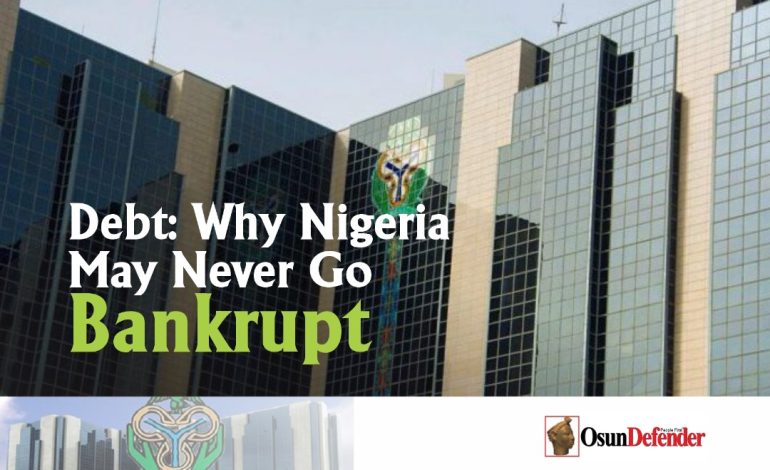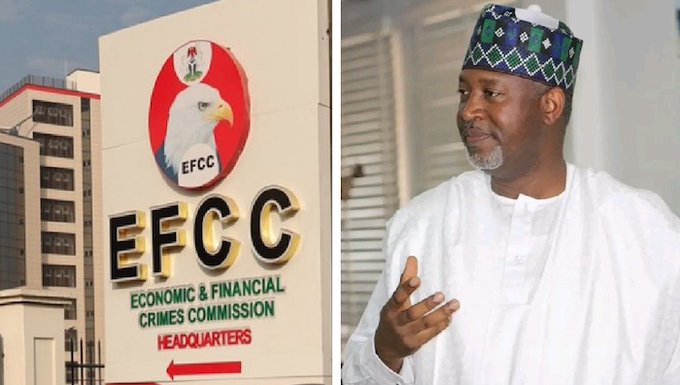Debt: Why Nigeria May Never Go Bankrupt


On December 20, 2023, the Debt Management Office said Nigeria’s public debt profile has increased to N87.91 trillion at the end of the third quarter of 2023.
The DMO disclosed this in a statement posted on its official X handle. According to the DMO, the figure represents a marginal increase of 0.61 per cent compared to N87.38 trillion recorded at the end of June 2023.
The debt office said domestic debt increased by N1.8trn while external debt reduced from $43.16bn as of June 30, 2023, to $41.59bn at the end of the third quarter.
The analysis of the above report shown that the debt profile of Nigeria is even more than times two of the Nigeria yearly budget.
Recently, President Bola Ahmed Tinubu signed the N28.7 trillion 2024 appropriation bill into law. One would easily may think with the debt profile of Nigeria and the 2024 budget, that Nigeria may go Bankrupt.
But that is not true. Nigeria may never go Bankrupt. Nigeria’s economic landscape, shaped by its vast natural resources and strategic fiscal policies, provides a foundation for understanding why the country may not face the specter of bankruptcy.
To comprehend this, it is essential to delve into various facets of Nigeria’s economic structure, governance, and external relations.
- Abundant Natural Resources: Nigeria is endowed with substantial natural resources, with oil being a key contributor to its revenue. Despite the volatility in oil prices, the consistent extraction and exportation of oil provide a significant income stream, acting as a buffer against financial instability.
- Economic Diversification: Efforts to diversify the economy beyond oil have gained traction. Sectors such as agriculture, telecommunications, and services contribute to a more resilient and dynamic economic landscape, reducing dependence on oil revenue and mitigating risks associated with commodity price fluctuations.
- Access to International Financial Markets: Nigeria’s ability to access international financial markets provides crucial leverage in managing its debt obligations. Strategic borrowing and negotiations for favorable loan terms, including extended repayment periods and low-interest rates, showcase the government’s commitment to sustainable fiscal practices.
- Strategic Debt Management: The Nigerian government’s approach to debt management is characterized by prudence. While external debt levels have increased, meticulous fiscal management ensures that the debt burden remains sustainable. The government’s ability to refinance existing debt and secure concessional loans reinforces its financial stability.
- Demographic Dividend: Nigeria’s youthful and growing population presents both challenges and opportunities. Effectively harnessing the demographic dividend through investments in education, healthcare, and job creation can spur economic growth, potentially reducing the risk of financial instability.
- Diverse Economic Sectors: Beyond its resource-rich profile, Nigeria boasts a diverse array of economic sectors. The resilience of industries outside the oil sector contributes to the country’s economic stability, providing a safety net against shocks in any particular industry.
- Investment in Infrastructure: Ongoing efforts to improve infrastructure, including transportation, energy, and technology, enhance the overall economic competitiveness of the country. Improved infrastructure attracts foreign investment and stimulates domestic economic activities.
- Global Partnerships and Trade Relations: Nigeria’s diplomatic efforts and participation in regional and international trade agreements foster global partnerships. Diversifying trade relations ensures that the country is not overly reliant on a single market, reducing vulnerability to external economic shocks.
- Macroeconomic Policies: The implementation of sound macroeconomic policies, including inflation control and exchange rate management, contributes to a stable economic environment. These policies provide a foundation for sustainable economic growth and resilience.
- Corruption Mitigation: Addressing corruption remains a priority. Anti-corruption initiatives and institutional reforms aim to improve governance, transparency, and accountability, creating an environment conducive to responsible fiscal management.
- Social Investment Programs: Government-led social investment programs targeting poverty alleviation and empowerment contribute to social stability. A stable society is essential for economic growth and resilience against potential financial crises.
- Adaptability to Global Trends: Nigeria’s adaptability to global economic trends and technological advancements positions it to navigate changing landscapes. Embracing innovation and staying attuned to global market dynamics enhance economic resilience.
- Local Manufacturing and Industry: Encouraging local manufacturing and industrial growth contributes to economic self-sufficiency. Reducing reliance on imports strengthens the domestic economy, fostering resilience against external economic pressures.
- Climate for Entrepreneurship: Creating a conducive climate for entrepreneurship and small business growth stimulates economic activity. A thriving entrepreneurial ecosystem contributes to job creation and economic stability.
- Community Engagement and Inclusivity: Ensuring inclusive economic growth and engaging local communities in development initiatives foster a sense of ownership and shared prosperity. Social cohesion is a critical element in building a resilient and economically robust nation.
In conclusion, Nigeria’s potential to avoid bankruptcy lies in the synergy of its rich resource base, diversified economy, strategic debt management, demographic advantages, and commitment to sound governance. While challenges persist, the country’s multifaceted approach positions it on a trajectory of economic sustainability and resilience.
Conclusion
However, challenges such as corruption, inefficient public institutions, and inadequate infrastructure remain. Addressing these issues is crucial for ensuring long-term economic stability. While the risk of bankruptcy is influenced by a myriad of factors, Nigeria’s resource endowment, economic diversification efforts, and strategic fiscal policies contribute to the optimism that the country may navigate its financial challenges without facing bankruptcy.


Sodiq Lawal is a passionate and dedicated journalist with a knack for uncovering captivating stories in the bustling metropolis of Osun State and Nigeria at large. He has a versatile reporting style, covering a wide range of topics, from politics , campus, and social issues to arts and culture, seeking impact in all facets of the society.










